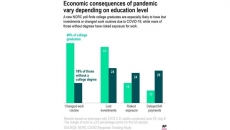What’s your relationship with money? Maybe your personal finances are like a distant cousin you barely think about — or an unsettling stranger you avoid. Or perhaps money feels like your enemy, frustrating you and rarely doing what you want.
In fact, 31% of Americans said they feel anxious when thinking about the current state of their personal finances, according to a NerdWallet survey last year.
That sounds exhausting. What if you thought of money as your friend instead? A more positive relationship can help you feel more confident and empowered to make the most of your money.
Addie McHale , a Denver-based certified financial planner, gives the following tips for befriending your money.
“These are things you can start to do today,” she says. “You don’t even have to get out a calculator.”
GIVE YOUR TIME AND ATTENTION
If you’ve ever grown apart from someone, you know that friendship takes work. Making quality time for each other — and not scrolling Instagram while you’re supposed to be listening — is key.
So spend meaningful time with your money. Schedule check-ins to review your recent spending. Hop into your retirement account to monitor its progress. Peek at the debts you’re repaying.
McHale, who’s also the founder of the financial services business Moneyfull , says that “miracles happen” when her clients start paying attention to their money and taking action. They gain momentum, she says.
For example, spend time tracking your spending and you may spot opportunities to cut expenses. You make those trims, and now you’ve saved money. Next, you’re looking into where to put that extra cash. Now, looky here, you’re investing, contributing to a savings goal or putting more toward paying off debt — all because you took the time to scan your spending.
TAKE AN INTEREST
You know that friend you know everything about — their birthday, beverage of choice, feelings about their mom? You know that stuff because you took an interest and learned it.
Same goes for your friendship with money. In addition to giving time and attention to your finances, make an effort to learn more. Seek out articles and books about money, discuss it with friends and family or consider getting professional guidance, like through a financial advisor.
McHale recommends trying a money podcast. “There are lots of ways to learn and incorporate it into your life very easily,” she says. “Anyone can listen to a podcast while they’re walking outside.”
SHOW APPRECIATION
Of course, you want more money. McHale points out that society often pushes the mindset that “you never have enough and should always buy more, more, more.” But, she says, “we have to get off that train and start to appreciate what we have.”
Try reflecting on what your money has allowed you to do. Or appreciate yourself for trying to understand your finances better. Or follow McHale’s advice: “Get in the habit of saying, ‘What am I grateful for today?’”
No, this gratitude won’t make you rich, but it will help you develop a more positive relationship with money. It’s like associating your friend with their warmth and thoughtfulness rather than their perpetual tardiness.
DON’T TALK SMACK
Good friends don’t say mean things to each other. Similarly, saying more positive words about money can help improve the way you feel about it.
“Start paying attention to the language we’re using around money, because of course those are connected to our thoughts,” McHale says.
For example, listen for phrases such as “I’m terrible with money” or “I don’t care about money.” Those kinds of words can act like crutches. Why try to improve your finances if you’re bad with money? Why save for retirement if you don’t care?
If you’re not comfortable with personal finance, consider reframing to say “I don’t understand this, but I’m going to take small steps to learn more,” McHale says.
Also aim for more empowering language. Rather than claiming you can’t afford something, McHale suggests saying that you’re choosing not to spend your money.
DROP THE JUDGMENT
Any friend who has confided in you likely expected a judgment-free zone. Give yourself that same compassion and try to let go of money shame.
McHale suspects that many people aren’t friends with their money, in part, because “it’s an emotional topic that they want to avoid.” But, she adds, “if we come from a more neutral place, maybe we can drop some of our money baggage.”
Aim to be more analytical and less emotional about money by scheduling times to check on your finances when you’re feeling calm and level-headed.
PREPARE TO FORGIVE
“If you’ve ever had a falling out with a friend, you know how important grace is and letting things go,” McHale says. Money friendships take hits, too. Finances can be hard to understand, so you’ll likely blunder.
Maybe you miss bill payments or overdraft or rack up debt. Beating yourself up is unproductive and can lead to resentment and avoidance.
“You must forgive yourself for past or current mishaps and mistakes,” McHale says. “It doesn’t mean condoning, but accepting it and learning from it and moving on.”






